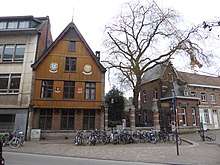Institute of Philosophy, KU Leuven
The Institute of Philosophy is the faculty of philosophy at the KU Leuven in the Belgian city of Leuven. It was founded in 1968 when the Institut supérieur de Philosophie - Hoger Instituut voor Wijsbegeerte of the Catholic University of Leuven (1835–1968) was split into a Dutch-speaking entity and a French-speaking entity. Its main buildings are located in the center of Leuven, Belgium at the Kardinaal Mercier Square, the founder of the original institute.
History

The Institut supérieur de Philosophie was founded by Cardinal Mercier on 8 November 1889 with the intent to be a beacon of Neo-Thomist philosophy, although Philosophy and Theology have been taught at the universities of Leuven since 1425. The institute initially taught programs in French and started courses in Dutch in 1933. After the language split of 1968, the Hoger Instituut voor Wijsbegeerte became part of the newly independent Katholieke Universiteit te Leuven, offering programmes in Dutch with little and at times no content taught in French, while the French-speaking Institut supérieur de Philosophie of the Université catholique de Louvain continued in the new city of Louvain-la-Neuve. In 1993, the institute became the faculty of philosophy.[1]
Programs offered
The institute offers both taught and research degrees (B.A., M.A., MPhil and PhD) as well as pre-doc and post-doc programs, both in Dutch and English. Students can take classes in both languages if desired.[2]
Departments
- Cultural Philosophy
- Ethics, Social and Political Philosophy
- Logic and Analytical Philosophy
- Metaphysics and Modern Philosophy
- Ancient, Medieval and Renaissance Philosophy
- Phenomenology
Husserl-Archives Leuven
The Institute, together with its French-speaking counterpart in Louvain-la-Neuve,[3] are well known as the home of the Husserl-Archives, the research center responsible for the publication of the philosophical work of Edmund Husserl.[4] After the death of the founder of the phenomenological movement, fearing for the destruction of his Nachlass at the hands of the Nazis, Father Herman Van Breda (Franciscan), PhD student at the institute, saved Husserl's manuscripts, library and widow and smuggled them to Leuven via diplomatic channels.
Research and publications
The Institute publishes a Dutch-language philosophy journal, called the Tijdschrift voor Filosofie, Ethische Perspectieven / Ethical Perspectives and the Bibliographical Directory of Philosophy (published jointly with the UCLouvain's Institut supérieur de Philosophie). It also organizes several major publication efforts, including the Husserliana (Husserl-Archives), the Aristoteles Latinus (De Wulf-Mansion centre), the Latin editions of Aristotle's works known to the medieval philosophers.
Numbers
- Ranks 24th in the QS World Philosophy Rankings (2014)
- More than 30 lecturers and professors
- 80 researchers in 5 departments
- more than 100 graduate students
- Circa 750 students (of which 50% international students)
Renowned emeriti
- Armand Thiery
- Samuel IJsseling
- Alphonse De Waelhens
- Herman Parret
- André Léonard
- Herman Van Rompuy
- Rudolf Bernet
- William Desmond
Guest researchers and lecturers
Internationally renowned professors who have lectured at the institute:
Notable former students
- Hans Lindahl, professor and former student
- Bruce Ellis Benson, professor, Wheaton College, USA
- Babette Babich (professor), professor of philosophy at Fordham University
- Thomas D. Carroll, priest and former student (PhD, and PhL) at the Leuven
- Marin Gillis, professor and former student
- Marc Sebrecht, professor and former student
- Joseph J. Kockelmans, professor, Pennsylvania State University, USA
- Renee Kohler-Ryan, senior lecturer, The University of Notre Dame, Sydney, Australia
- Wha-Chul Son, professor, Handong Global University, Korea
- John Hymers[5], assistant professor, La Salle University, Philadelphia, USA
- Tanya Loughead, Professor of Philosophy, Canisius College, Buffalo, NY, USA
- Richard Chung Kee Lee assistant professor, Hong Kong Baptist University
- Damian C. Ilodigwe lecturer in Philosophy, SS Peter & Paul Major Seminary, Ibadan, Nigeria
- Nikolaj Zunic associate professor, St. Jerome's University, Waterloo, Ontario, Canada
- Jeffrey Bloechl, associate professor, Boston College, USA
- Stephan Lake, associate professor, Trinity Christian College, IL, USA
- Jovino G. Miroy, associate professor, Ateneo de Manila University, Philippines
- Michael Newman, professor of art writing, Goldsmiths University of London, UK
- Stuart Rennie[6], associate professor, University of North Carolina at Chapel Hill, USA
See also
References
- "Archived copy". Archived from the original on 2009-04-04. Retrieved 2013-05-07.CS1 maint: archived copy as title (link)
- "Archives Husserl". Uclouvain.be. Retrieved 6 January 2019.
- "Husserl Archives Leuven". Hiw.kuleuven.be. Retrieved 25 March 2019.
- "JH Homepage". Hymers.eu. Retrieved 25 March 2019.
- "Stuart Rennie - Department of Social Medicine". Med.unc.edu. Retrieved 25 March 2019.